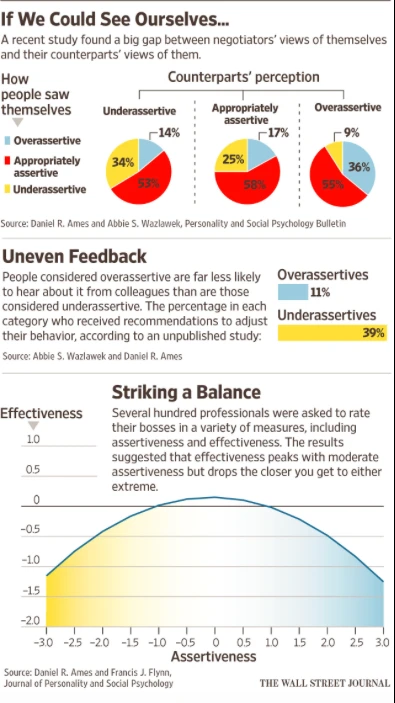You may recall that earlier we reported on a new study from the Columbia Business School called “Pushing in the Dark: Causes and Consequences of Limited Self-Awareness for Interpersonal Assertiveness.”
 The piece is picking up steam and deserves attention. This time, we report the study’s tips on how to address the problem.
The piece is picking up steam and deserves attention. This time, we report the study’s tips on how to address the problem.
The latest place to notice the study: The Wall Street Journal, which writes, “Self-awareness is crucial in the workplace. It can also be dauntingly hard to get.” The piece, in fact, is written by the study’s authors Daniel R. Ames and Abbie S. Wazlawek, who remind us that “knowing your own strengths and limitations, and how others see you and your behavior, has been linked to a range of positive outcomes. But when it comes to understanding how others see us, many of us are in the dark.”
So if you are a jerk — if you lack the required self-awareness to even recognize your bad behavior — how can you address (or at least diagnose) the problem? The authors write: “Drawing on the insights of social scientists, and our own research, we offer four suggestions that can help people become more self-aware.” These include:
- “Ask People to Fire Away: One effective way to raise self-awareness is to gather anonymous assessments from peers and colleagues, with the results collected into an overall report that doesn’t identify who said what.”
- “Ask About the Right Topics: You don’t want—or need—a report card that covers every possible subject.”
- “Do a Thorough Follow-Up: A feedback report will inevitably yield a mix of noise and signal. To get the most out of it, look for multiple data points, like a pattern that stretches across rating questions and open-ended comments.”
- “Take a Small but Concrete Step: Commit, today, to some small, concrete step as a way to move ahead. Do something—one thing—that can initiate a process that might lead to greater self-awareness.”
Is there a counterpoint? Time Magazine may have found one previously, when it reported the “3 Ways Being a Jerk at Work Pays Off.” These include “People think they’re more creative; They’re better negotiators; and They’re good schmoozers.”
Counterpoints aside, we aren’t so naive as to believe that the four steps from the Columbia study will improve all behavior — and remove all the jerks at work. But they certainly can start someone on the path to greater self-awareness, which for leaders, is a critical success factor.
